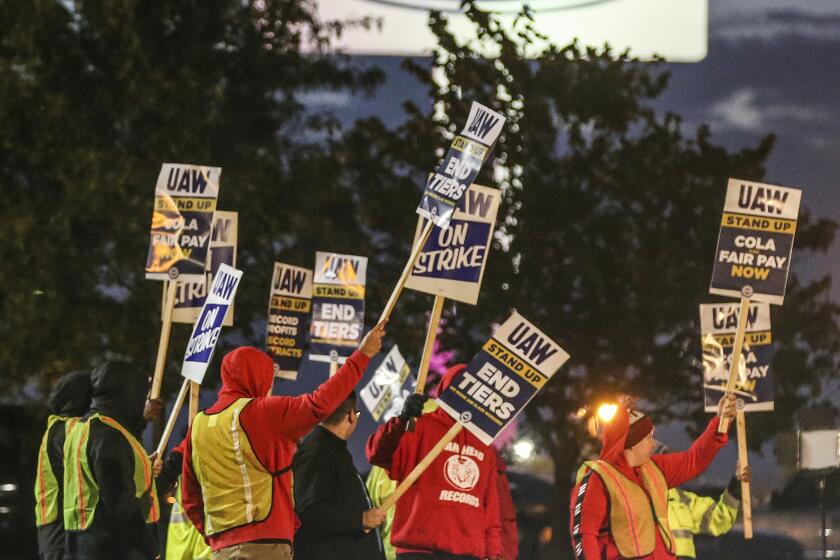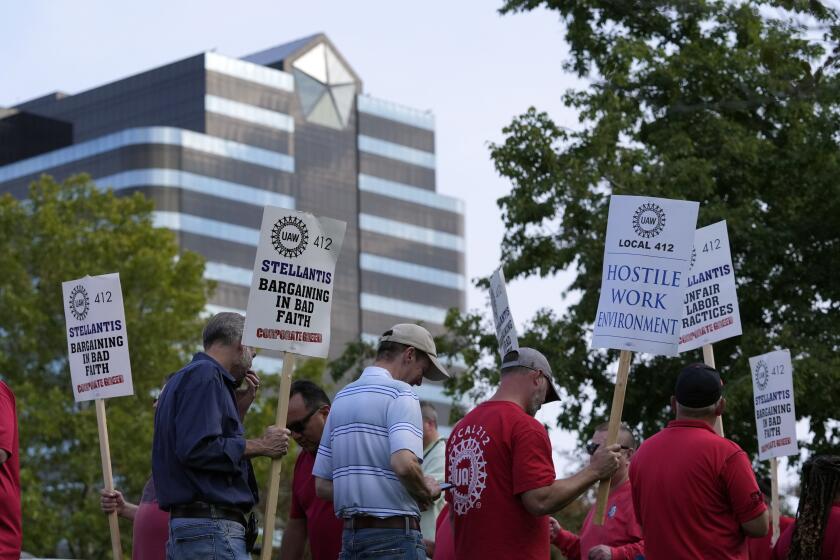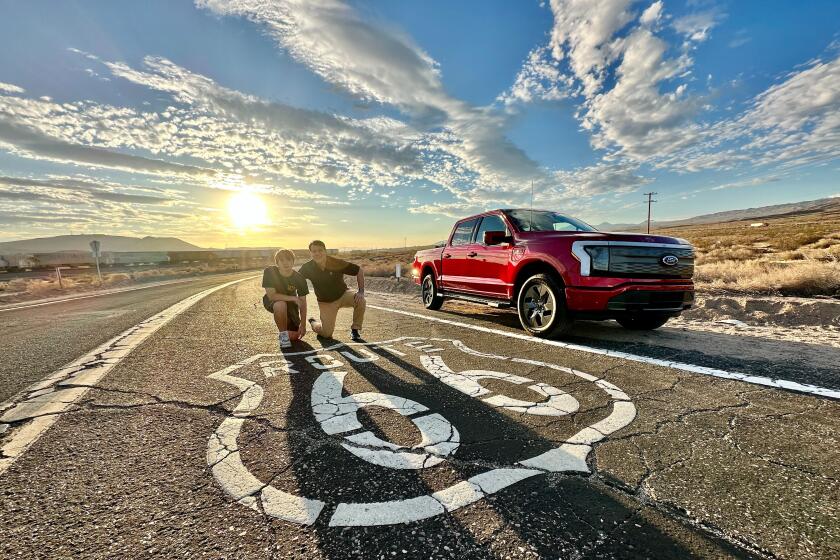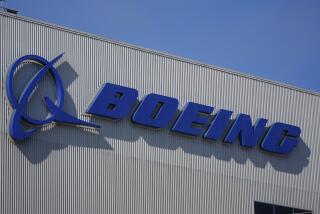Ford Executive Chair Bill Ford calls on autoworkers to end strike, says company’s future is at stake
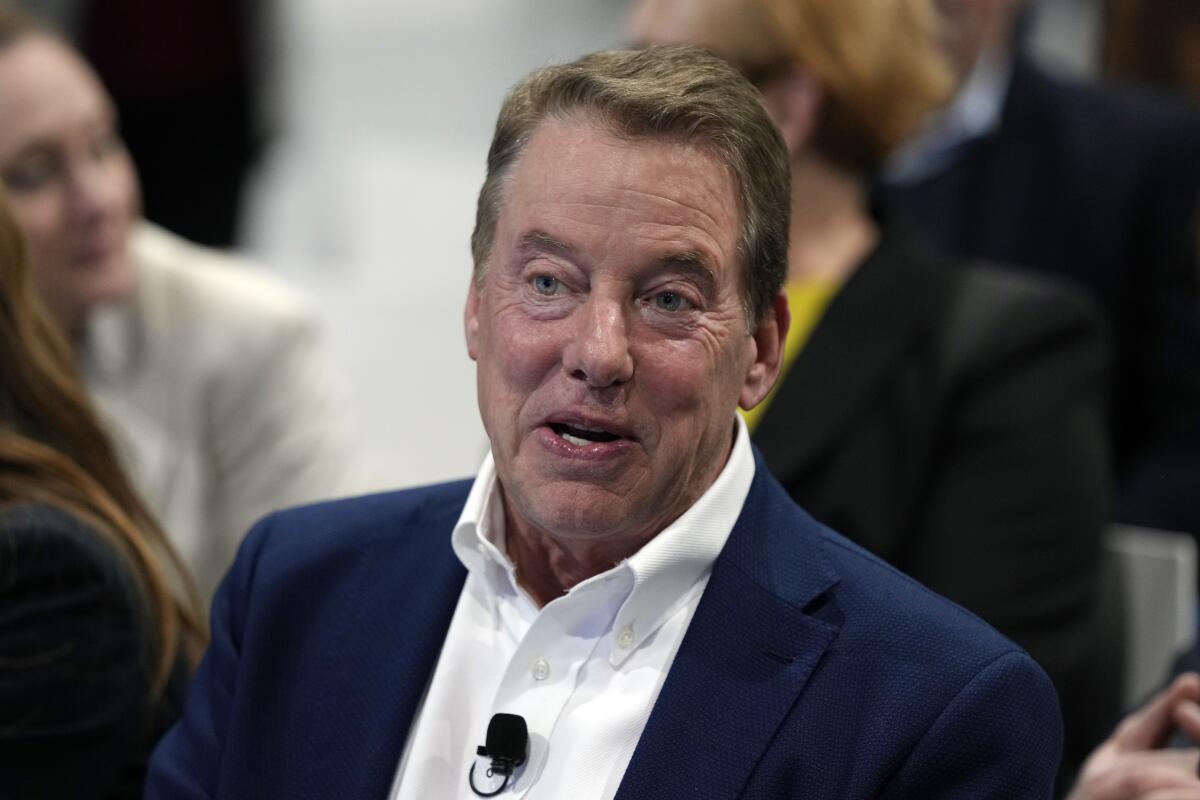
- Share via
Ford Motor Co. Executive Chairman Bill Ford called on autoworkers to come together to end a monthlong strike that he says could cost the company the ability to invest in the future.
In a rare speech during contract talks in the company’s hometown of Dearborn, Mich., Ford said high labor costs could limit spending on developing new vehicles and investing in factories.
“It’s the absolute lifeblood of our company. If we lose it, we will lose to the competition. America loses. Many jobs will be lost,” said the great-grandson of company founder Henry Ford.
The company, he said, builds more vehicles in America and has more United Auto Workers employees than any company, which has increased its costs in a highly competitive industry.
Ford has 57,000 UAW workers compared with 46,000 at General Motors and 43,000 at Stellantis. “Many of our competitors moved jobs to Mexico as we added jobs here in the U.S.,” Ford said.
The company is near an impasse with the UAW union, which walked out in targeted strikes at all three Detroit automakers Sept. 15.
Last week, 8,700 union members walked out at the largest and most profitable Ford plant in the world, the Kentucky Truck Plant in Louisville.
The United Auto Workers union escalated its walkout against Detroit’s Big Three automakers by going on strike at the largest and most profitable Ford plant.
Ford said the strike at the Kentucky plant is harming tens of thousands of Americans who work for parts suppliers and Ford dealers. The strike also could cause a fragile parts supply base to collapse, he said. “If it continues, it will have a major impact on the American economy and devastate local communities,” he said.
Ford is only the fourth family member to lead the 120-year-old company, said he has watched other countries lose their auto industries, then all of their manufacturing base. He said strong American manufacturing is essential for national security.
“We need to come together to bring an end to this acrimonious round of talks,” Ford said. “I still believe in a bright future — one that we can build together. I still believe the automobile industry is a major force for good in our country. We will continue to be there when America needs us most.”
Last week, after the Kentucky strike began, a top Ford executive said on a conference call with reporters that the company had reached the limit in how much it was willing to spend to end the strike.
UAW President Shawn Fain said that Bill Ford knows he can settle the strike by calling Chief Executive Jim Farley and telling him “to stop playing games and get a deal done.”
The United Auto Workers union expands its strikes against major automakers by walking out of dozens of locations in 20 states.
He threatened to strike and close Ford’s Rouge truck complex in Dearborn. “It’s not the UAW and Ford against foreign automakers. It’s autoworkers everywhere against corporate greed,” Fain said in a statement.
At the Ford Michigan Assembly Plant in Wayne, west of Detroit, few workers are on the picket lines Monday afternoon said they listened to Ford’s speech.
When told what Ford said about investing in the future, line worker Steve Applebee said he agreed. “I get that,” he said. “I can see both sides.”
But he also said Ford is paying CEO Farley $21 million per year when starting pay for Ford factory workers is up only about $3 per hour from when he started with the company 31 years ago.
Ford’s offer of a 23% general wage increase barely covers inflation over the last three or four years, said Applebee, 59.
Ford CEO Jim Farley says the Ford F-150 Lightning, the world’s first all-electric mass-market pickup truck, represents ‘the tip of the spear’ in Ford’s EV strategy.
Carlos Hollins, 47, of Detroit, who just started with Ford in July and is at the low end of the pay scale, said workers gave up raises in 2008 when Ford and the others were in financial trouble. They were promised that concessions would be restored when the company recovered.
“We shouldn’t have to suffer, especially for the retirees,” he said. “They need to pay us what we deserve.”
The union has said retirees haven’t received a pension increase for at least a decade.
Hollins said workers should get everything they are asking for, and Ford has enough money to pay it.
The speech from Ford arrives with the entire auto industry making a historic and expensive shift from internal combustion engines to electric vehicles.
Fain has said Ford and crosstown rivals General Motors and Jeep maker Stellantis are making billions in profits, and that workers should get a share. He says the workers should be repaid for sacrificing general pay raises, cost of living adjustments and agreeing to lower wage tiers to keep the companies afloat during the Great Recession.
The union began striking at targeted factories after its contracts with the companies expired. It started picketing one assembly plant from each company, but that has since spread to 38 parts warehouses at GM and Jeep maker Stellantis. The UAW later added another assembly plant at both GM and Ford and Wednesday, Fain made the surprise announcement that the union would walk out at the Kentucky plant, which makes Super Duty pickups and large Ford and Lincoln SUVs.
About 34,000 of the union’s 146,000 employees at all three automakers are now on strike.
The seemingly widening labor rift suggests that Ford and the union may be in for a lengthy strike that could cost the company and workers billions of dollars.
The union has said Ford’s general wage offer is up to 23% over four years and that it has reinstated cost-of-living raises. GM and Stellantis were at 20%. But Fain said none was high enough.
More to Read
Inside the business of entertainment
The Wide Shot brings you news, analysis and insights on everything from streaming wars to production — and what it all means for the future.
You may occasionally receive promotional content from the Los Angeles Times.
